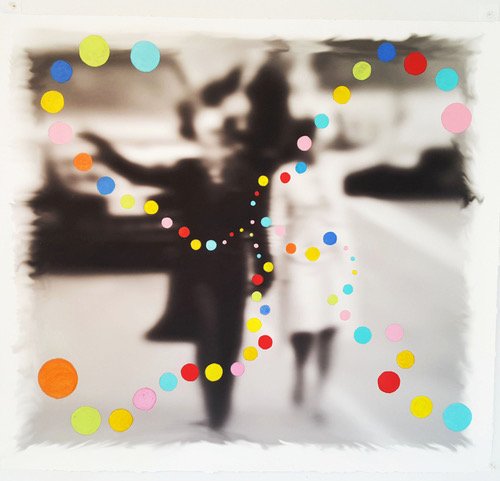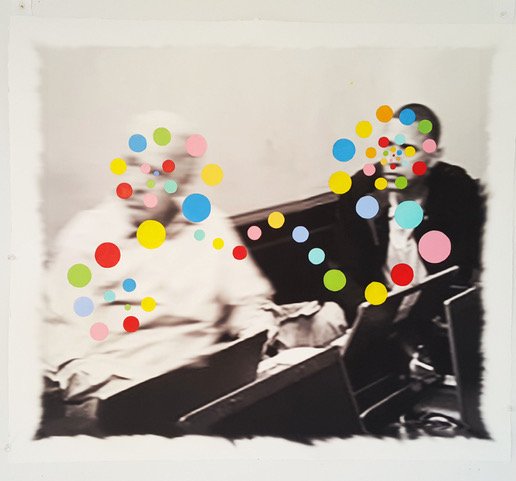The Situation Room (ink and acrylic on paper 36”x 36”)
Mary Behrens
When I first picked up President Obama’s memoir, Dreams From My Father, in 2008 when the President was on the campaign trail, I was prepared to find a memoir like those of many public figures—tiresomely self-focused, fact laden, light on personal complexity, and devoid of literary language. By literary language I mean language that is idiosyncratically concrete and precise, that has edge and evocative power, and that is not canned or clichéd. What I found was a work of literary nonfiction in which the writer’s voice was too authentic and his writing too idiosyncratic to be the work of anyone but him. It was unlike President Kennedy’s Profiles in Courage, which was partially ghostwritten, or President Clinton’s, My Life, which owed a good bit to the collaboration with his editor. Here was a work of literary dimension that recalled the writings of our other literary Presidents: Jefferson, Lincoln, Grant, and Theodore Roosevelt.
Reading the opening chapter, which Obama wrote in the early nineties after his graduation from Harvard Law School (where he was President of The Harvard Law Review), I was pulled in because the opening paragraph was so fine it could have been written by James Baldwin. Here was the detachment and irony, image-making precision, and scene-setting intelligence of a seasoned writer:
A few months after my twenty-first birthday, a stranger called to give me the news. I was living in New York at the time, on Ninety-fourth between Second and First, part of that unnamed, shifting border between East Harlem and the rest of Manhattan. It was an uninviting block, treeless and barren, lined with soot-colored walk-ups that cast heavy shadows for most of the day. The apartment was small, with slanting floors and irregular heat and a buzzer downstairs that didn’t work, so that visitors had to call ahead from a pay phone at the corner gas stations, where a black Doberman the size of a wolf paced through the night in vigilant patrol, its jaws clamped around an empty beer bottle.
So when I listened to the closing of President Obama’s final State of the Union address, I was jolted but not surprised to hear his ingenious riff on America’s foundational poet, Walt Whitman, who is the most vehement literary voice for American democracy in the nineteenth century and who is also the inventor of the free verse revolution in poetry—an achievement that is as distinctively American as jazz, baseball, the suspension bridge, the sky scraper, and the cheeseburger.
I realize that President Obama’s speeches are written collaboratively with his speechwriters, but they bear his imprint and language. In his closing, the President’s celebration of every-day Americans as exemplary citizens was an expression of his life’s work, and vision, and his commitment to the American people with and for whom he’s worked since his days as a community organizer in Chicago.
The President’s invocation of American citizens evokes some of the most beautiful passages in Whitman’s greatest poems like “Song of Myself,” “The Sleepers,” “Crossing Brooklyn Ferry” in which anaphoric structure (the repetition of a phrase to make a rhythmic refrain) and cataloging enumeration (the listing of things, attributes, objects) define the poetics. In section 5 of “A Song for Occupations,” Whitman’s celebratory list is robust: “Coal-mines and all that is down there / Iron-works, forge-fires in the mountains / The blast furnace and the puddling furnace / Oil works, silk-works, white-lead works” and it goes on for pages.
In using quintessential Whitmanesque anaphoric and cataloging techniques in the closing of his speech, President Obama did something compelling and original as the following reveals:
It is not easy. Our brand of democracy is hard. But I can promise that a little over a year from now, when I no longer hold this office, I will be right there with you as a citizen, inspired by those voices of fairness and vision, of grit and good humor and kindness that helped America travel so far. Voices that help us see ourselves not, first and foremost, as black or white, or Asian or Latino, not as gay or straight, immigrant or native born, not as Democrat or Republican, but as Americans first, bound by a common creed. Voices Dr. King believed would have the final word—voices of unarmed truth and unconditional love.
They’re out there, those voices. They don’t get a lot of attention, nor do they seek it, but they are busy doing the work this country needs doing.
I see them everywhere I travel in this incredible country of ours. I see you. I know you’re there. You’re the reason why I have such incredible confidence in our future. Because I see your quiet, sturdy citizenship all the time.
I see it in the worker on the assembly line who clocked extra shifts to keep his company open, and the boss who pays him higher wages to keep him on board.
I see it in the Dreamer who stays up late to finish her science project, and the teacher who comes in early because he knows she might someday cure a disease.
I see it in the American who served his time, and dreams of starting over—and the business owner who gives him that second chance. The protester determined to prove that justice matters, and the young cop walking the beat, treating everybody with respect, doing the brave, quiet work of keeping us safe.
I see it in the soldier who gives almost everything to save his brothers, the nurse who tends to him ‘til he can run a marathon, and the community that lines up to cheer him on.
It’s the son who finds the courage to come out as who he is, and the father whose love for that son overrides everything he’s been taught.
I see it in the elderly woman who will wait in line to cast her vote as long as she has to; the new citizen who casts his for the first time; the volunteers at the polls who believe every vote should count, because each of them in different ways knows how much that precious right is worth.
That’s the America I know. That’s the country we love. Clear-eyed. Big-hearted. Optimistic that unarmed truth and unconditional love will have the final word. That’s what makes me so hopeful about our future. Because of you. I believe in you. That’s why I stand here confident that the State of our Union is strong.
If you put this next to section 15 of “Song of Myself,” just one of many passages in many Whitman poems that enumerate and catalog the diversity of the unsung citizen who is the pulse of the nation, you can see President Obama’s literary source. Whitman celebrates the: “contralto, carpenter, pilot, duck-shooter, spinning-girl, deacon, lunatic (which he means compassionately), quadroon, machinist, half-breed, newly come immigrants,” and so on. Obama celebrates the ordinary person, the unsung citizen, the soul of the nation, the humble person, the “quiet, sturdy citizen,”—not the rich or famous, or the glitzy or powerful. His “clear-eyed, big hearted, optimistic” citizen evokes Whitman in so many of his poems such as in “America,” where the poet extols the common person as “strong, ample, fair, enduring, capable.” Like Whitman, Obama address the “you” meaning the common person as the moral core of society. And, one can say, I think, that President Obama has believed in the “you” from the start—and not just in his rhetoric but in his ceaseless work for the nation and his deeply humane values. It is not surprising that in his speech he invoked Pope Francis whose humane vision of the other—especially the disenfranchised, the poor, the needy, and the common man, woman, and child—dovetails with President Obama’s democratic vision.

The Walk (ink and acrylic on paper 36”x 36”)
Mary Behrens
In accord with his humane vision, President Obama has done more for the nation than one could have imagined, especially in this era of bitter right-wing partisanship and its endless war to falsify the President’s record, and in the process undermine the essential democratic value of sharing power across party lines with cooperative good will. The President has often compromised too readily, has failed to rebuke the ignorance of his attackers, but his steadfast, calm and dignified, highly intelligent leadership has yielded an impressive record: he has brought health care to millions, has prioritized the grave crisis of climate change, saved the auto industry, dealt a death blow to Al-Quaeda with the killing of Bin Laden, brought a strong female presence to the Supreme Court, initiated record breaking renewable energy sources, and has secured unprecedented clean water for the nation; on his watch the private sector economy has gained fourteen million jobs since 2010—a high mark of growth in this new century, and he has, notwithstanding global complexities, restored US honor in the global arena after the disgrace of the Iraq war and the cowboy diplomacy of the Bush administration.
He has succeeded on these fronts and has failed on others—but has done it all with grace, dignity, impeccable integrity (the Right Wing could dig up no personal scandal on this President), and a tireless work ethic hard to match in Presidential history. And at least one vein of his democratic vision owes something to Walt Whitman, and perhaps only a President as gifted as he is could have tapped into it.
And though I had planned to end my essay with the previous sentence, I’m jolted here in March 2016 by the grotesque and juvenile behavior of the Republican presidential candidates Ted Cruz, Marco Rubio, and Donald Trump during the past months. Never in modern American politics have presidential candidates displayed so little decorum, so little civility, so little maturity, as the name calling, smearing, vilifying, bigotry, and bullying we’ve witnessed, especially by Mr. Trump. This unfortunate moment in national politics affords us another appreciation of President Obama’s decorum and composure, and his thoughtful demeanor especially under pressure. His dignity has graced the nation for the past seven years and sets a high bar for any head of state.
—Posted: March 21, 2016
Peter Balakian
Peter is the author of eight books of poems including Ozone Journal, which won the 2016 Pulitzer Prize for poetry, and the recently published No Sign (2022). His memoir Black Dog of Fate won the PEN/Albrand Award; and The Burning Tigris: The Armenian Genocide and America's Response was a New York Times Best Seller. He is Donald M. and Constance H. Rebar Professor of the Humanities in the Department of English at Colgate University.








